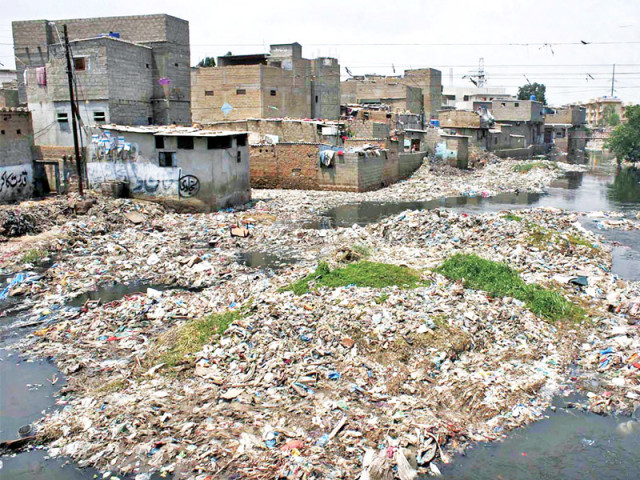Not serving their purpose: Karachi’s sewerage system holds no water
Encroachments on city’s nullahs mean that when it rains, roads and streets will be flooded.

The rainy season is around the corner and Karachi’s sewerage infrastructure is collapsing as land grabbers encroach upon most of the city’s storm water drains and nullahs, choking them in the process. This means that when it rains, the city’s roads and streets will be flooded.
The government discusses in length measures to restore peace in the city and with the focus firmly on the law and order situation, illegal encroachments on nullahs and their potential impact during monsoon have managed to go under the radar.
The Karachi Metropolitan Corporation (KMC) has tried to work out an efficient plan to counter the problem but had been able to make little headway. It cites a lack of political will to remove these illegal encroachments and claims that without the backing of the government, it will be unable to fight the encroachers.
“If we are to remove illegal encroachments from the nullahs, then we are to require political backing,” said KMC technical service director, Niaz Ahmed Soomro. “Without that, it is impossible for the relevant departments to save the city from this menace.”
The city’s major natural drains, including the Gujjar, Orangi, Sukhan and Thaddo nullahs, carry its sewage to the sea every day. The sewage arrives into these nullahs from 18 smaller drains that span across the city.
There are 35,000 housing units along the Gujjar Nullah, he added, and its width, once 100 feet, is now a mere 15 feet. Of the eight channels that fall into the Gujjar Nullah, six have been choked due to excessive dumping of garbage and illegal constructions. Soomro claimed that the KMC plans to conduct a survey of the nullahs to identify the encroachment and remove them, and added that Rs100 million have been allocated for this purpose.
Water on the roads is not the only consequence of these encroachments; an entire family was lost after it fell into the Gujjar Nullah due to inundation last rainy season.
Soomro admits that more lives may be lost if something is not done soon. “People might suffer the same fate again,” he warned.
KMC’s chief engineer Ibrahim Baloch revealed how deeply rooted the problem is. “Established landmarks and buildings such as the Shaheen Complex, the Sindh secretariat and the Urdu Bazaar are all established on nullahs,” he claimed. “There are 20,000 housing units established over the different nullahs. How can we possibly remove all these encroachments?”
The inability, however, is not due to a want of trying, claimed Baloch.
“We have planned everything and have also prepared maps on how to handle the situation during the anti-encroachment campaign,” he said. “However, without the help of the government, both provincial and federal, we cannot remove the encroachments as the resources we possess are insufficient.”
The citizens are concerned
The residents of the city that are struggling for better planning and environment in Karachi are deeply concerned by the encroachments on the nullahs.
Amber Alibhai, of the Shehri-Citizens for Better Environment, termed the encroachments on nullahs as a serious hazard. “We are living on heaps of garbage and sewage is being dumped into the sea without being treated,” he said. “Instead of doing something about this, we just bury our heads in the sand.”
Marine Pollution: Sewage killing sea life in the coasts
Sewage is being dumped into the sea without being treated, claimed World Wide Fund for Nature-Pakistan chief conservator Muhamamd Moazzan Khan. “Solid waste is being dumped into the sea without being treated as there is only one waste treatment plant in the entire city that still works,” he said. “Oil grease, edible oil, chemicals and even metals are being dumped into the sea.”
Research shows that the city produces 980,000 tons of solid waste and most of it is dumped into the sea, he claimed. “As much as 90 per cent of the marine life around Karachi and other creeks has been wiped out due to this.”
Published in The Express Tribune, July 17th, 2014.



















COMMENTS
Comments are moderated and generally will be posted if they are on-topic and not abusive.
For more information, please see our Comments FAQ